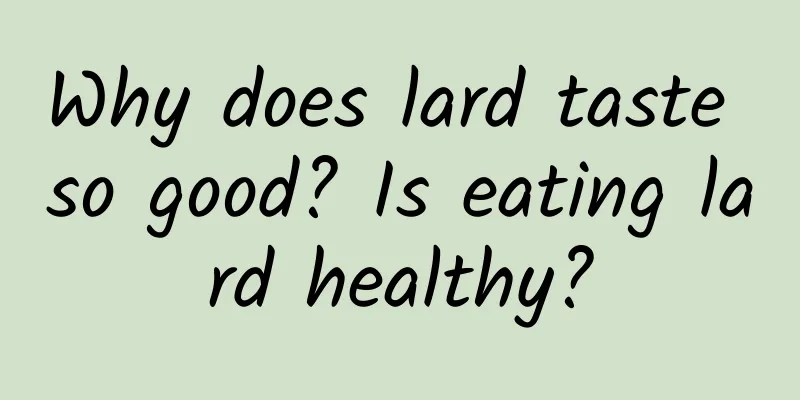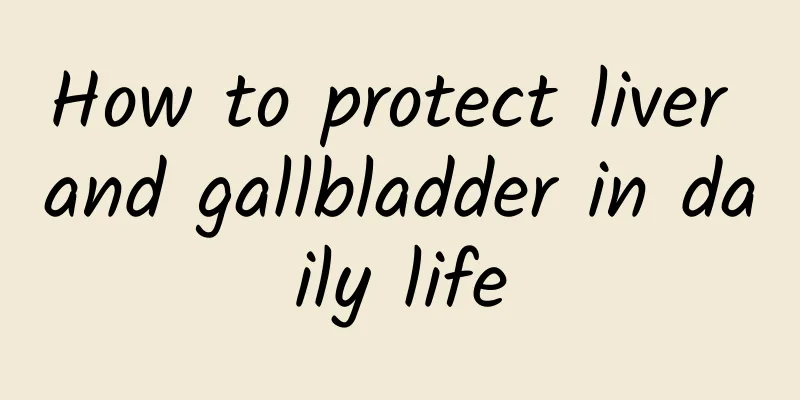Why does lard taste so good? Is eating lard healthy?

|
Lard rice, lard stir-fried dishes, lard plain noodles... Adding a little lard to cooking can instantly elevate the taste of the food. Especially in the past, many people's childhood memories of a bowl of lard residue were simply "a delicacy on earth." Nowadays, with the improvement of living standards, healthy eating has attracted more and more attention. Many people may have heard that "long-term intake of lard may be associated with cardiovascular disease." So, is eating lard healthy? Is it nutritious? Xiao Ke will help you solve these questions~ Question 1: Why does lard taste so delicious? Lard tastes like this in one word: delicious. Wang Silu, a senior national food inspector, explained: In fact , the unique aroma of lard comes from the decomposition products of trace amounts of special proteins and glycerides . In addition, lard itself contains more than 40% saturated fatty acids, which will fuse fat, starch and cellulose, making the dishes "crisp, crunchy, moist and smooth". Question 2: What is the nutritional value of lard? Fu Shufang, a technician at the National Key Laboratory of Cardiovascular Diseases, introduced that lard is a type of food with relatively rich ingredients, mainly fatty acids, vitamins, minerals, etc. 1. Fatty acids One spoonful of lard contains 5 grams of saturated fat, 5.8 grams of monounsaturated fat, and 1.4 grams of polyunsaturated fat. From the perspective of fat composition alone, the unsaturated fat content of lard is between butter and olive oil . 2. Vitamins One tablespoon of lard contains 1,000 international units (IU) of vitamin D, second only to cod liver oil. Vitamin D is essential for calcium absorption, which helps the body grow and maintain bone health. Lard also contains other essential vitamins for the human body, such as vitamin A and vitamin B, so lard is a food that is relatively rich in nutrients . In addition, lard has higher thermal stability than other vegetable oils, so it has a higher smoke point during the cooking process and is not easy to decompose and produce some harmful substances . Question 3: Does lard cause cardiovascular damage? Many people believe that "in the past, when material resources were scarce, people often ate lard, and fewer people suffered from heart disease and cardiovascular diseases, so eating lard is better for health." In fact, this idea is not entirely correct! Xie Xinhui, chief physician of Jixi Jikuang Hospital in Heilongjiang Province, said that the main component of lard is fat, and relatively speaking, saturated fat is relatively high, which is why lard is criticized as unhealthy. Too much saturated fat may lead to abnormal lipid metabolism, causing obesity and inducing cardiovascular problems . However, lard contains not only saturated fat. In 100 grams of lard, there are 39 grams of saturated fat, 45 grams of monounsaturated fat, and 11 grams of polyunsaturated fat. Saturated fat accounts for 40% of lard. In comparison, the saturated fat in butter far exceeds that in lard . And the margarine and artificial cream added in many desserts contain a lot of trans fatty acids, which are the most harmful to the body. In addition, cardiovascular and cerebrovascular diseases are not the result of a single risk factor, but the result of multiple risk factors working together, such as common high blood pressure, high blood lipids, high blood sugar, high-salt diet, smoking, excessive drinking and other bad living habits, as well as genetic factors and other factors. Dr. Xie Xinhui suggests that if you are already a patient with cardiovascular and cerebrovascular diseases, it would be better to reduce the intake of products such as lard as much as possible . If your blood lipids are already abnormal, it is also okay to appropriately reduce the intake of these foods rich in saturated fat. But if you are a relatively healthy person, there will not be much risk in consuming appropriate amounts of lard in your daily life . Question 4: Can lard detoxify and fight cancer? There are various claims about lard on the Internet, such as "lard can detoxify and remove toxins from puffer fish and other marine fish", "eating lard can prevent cancer"... Wang Silu, a senior national food inspector, said: Lard is made from pig fat and has a complex composition. In addition to the vast majority of triglycerides, it also contains cholesterol and minerals such as zinc and selenium. None of these nutrients has the effect of antagonizing pufferfish toxin in animal experiments. Therefore, it is not credible that eating lard can "detoxify" . Many people believe that "vegetable oils are prone to produce carcinogens when heated at high temperatures, but lard does not." Wang Silu said that lard itself contains more saturated fatty acids, which is nearly three times that of olive oil (the saturated fatty acid content in olive oil is 14%, while that in lard is 40%). The more saturated fatty acids you consume, the greater your risk of cardiovascular and cerebrovascular diseases such as obesity, hyperlipidemia, and heart disease. Therefore, lard is not a magical food. Lard mainly provides fat and calories to the body. In the final analysis, its seasoning effect is far greater than its nutritional effect . Question 5: What should we pay attention to when eating lard? Fu Shufang, a technician at the National Key Laboratory of Cardiovascular Diseases, introduced that although lard is rich in various nutrients, it cannot be consumed at every meal. All foods must be balanced, and the same applies to the use of oil . 1. Do not consume more than 50 grams of lard per day According to the "Dietary Guidelines for Chinese Residents", the amount of saturated fat consumed per day should not exceed 10% of the total calories. If the daily intake of calories is 2,000 kcal, the saturated fat should be controlled within 20 grams, which is about 50 grams of lard. However, eating other foods such as meat, eggs, milk, and processed foods will result in the intake of saturated fat, so lard should only be eaten occasionally as a change . 2. When there are more meat dishes, try to use vegetable oil If you have a meal with a lot of meat, such as pork, beef, lamb, chicken, fish, etc., try to use vegetable oil when cooking. If you like to eat meat, try to use vegetable oil as the main cooking oil. 3. People who have been vegetarians for a long time can use it in moderation If the dishes are mainly vegetarian, you can use some lard. People who eat vegetarian food for a long time can choose vegetable oil or animal oil with higher saturated fat content . 4. Patients with cardiovascular diseases should use it as little as possible. For patients with atherosclerosis or people with hyperlipidemia and hypertension, the intake of saturated fat can be reduced from 10% to 7%. |
<<: Can you play with your phone safely by turning on the “eye protection mode”?
>>: Will drinking lemon water cause kidney stones? No, it actually has this benefit...
Recommend
Menstruation is delayed for one day and one is dark and one is shallow
If a woman does not use proper contraceptive meth...
What causes itching around the vagina?
There are many kinds of gynecological diseases am...
How harmful is it to abort the first child?
For female friends, abortion is a very dangerous ...
Where should I get moxibustion for excessive leucorrhea?
Leucorrhea is the secretion from the female vagin...
What are women's diseases?
The word "disease" should not be unfami...
What causes breast pain?
Many women will find that they are prone to breas...
Knowledge about women's breasts
Breasts are a basic symbol of femininity, and big...
What's the matter with the brown color on the girl's underwear?
If there are some brown substances on a girl'...
Reasons and treatments for dark and light menstruation
Menstruation is of great significance to female f...
30 weeks premature baby picture
Every pregnant mother hopes to give birth to a he...
Tips for solving stomach acid problems in pregnant women
After pregnancy, varying degrees of morning sickn...
Fetal system B-ultrasound
In the case of pregnancy, we would say that we ne...
What are the maintenance methods after hysterectomy?
When it comes to some maintenance methods after u...
What changes will occur in the body of people who eat kidneys frequently?
Chinese people are very fond of various animal of...









